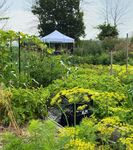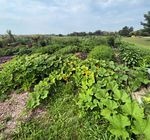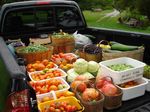DIGTHIS FALL 2021 - DURHAM INTEGRATED GROWERS
←
→
Page content transcription
If your browser does not render page correctly, please read the page content below
DigThis
1
Fall 2021
A mega edition this time.
Enjoy!
Mobile Food Market in north Durham
The Nourish and Develop Foundation’s (TNDF) At the moment MFM is a refigerated van,
Mobile Food Market (MFM) is a travelling tents and tables popping up at these different
produce stand! It is selling fresh, local, locations, but we will be adding a retrofitted
organically-grown produce, meal kits and enclosed cargo trailer to the infrastructure
prepared meals at affordable prices. The MFM by 2022, which will act as the produce stand
aims to be a reliable and convenient source itself. For upcoming schedules and more
for nutritious food. It’s an innovative solution information, please check our website at
to rural food deserts (areas with no, or limited www.tndf.ca/mobilefoodmarket/
access to grocery stores or affordable food or follow us on social media
options) and food insecurity (ensuring people @nourishanddevelopfoundation.
in the community have a sufficient quality For inquiries or ideas, please contact Zoe at
and quantity of nutritious food). By outfitting zoe@tndf.ca.
it with features like an ice cream truck jingle
and colourful branding, we work towards
making this resource fun and engaging for all
members of the community.
The MFM is currently visiting 11 different
locations throughout Brock Township,
including Cannington, Beaverton, Sunderland,
Gamebridge, Port Bolster, Manilla, and
Wilfrid. We aim to operate year-round, and are
currently in the process of securing indoor Artist’s
locations for the winter. rendering
of future
set-up.
Agri-Hero
will also find local cheese and butter, maple
syrup, honey, emu oil creams, handcrafted
soaps, and so much more!
This season, we invite you to take a drive north traces its roots to the Scottish Highlands, As the name suggests, the Bowman’s shop
to Enniskillen for an enchanting visit to one of and has been selected for its gentle nature. displays artists’ work from around the region.
our best local organic beef farms! Located at They are naturally polled (hornless), and as a The gallery merits a visit on its own!
1721 Durham Regional Rd 3 (Hampton, herd animal, thrive in big groups, with a set For more information, visit their website:
L0B 1J0), see how this multigenerational hierarchy. The meat produced is of the utmost galleryonthefarm.com/
family farm operates, while simultaneously quality.
browsing work from local artists and artisanal To visit, call (905) 263-8245 or email
At Gallery on the Farm, the beef is sold frozen, galleryonthefarm@hotmail.com
producers of fine foods!
in all manner of cut such as in roasts, steaks,
The Bowman family raises a fine Red and ground (including as burgers) and sausage. A
Black Angus beef on-site. This breed of cattle price list can be found online, or in store. You2
GardenStory
The Field Community Garden
The Field Community Garden was officially Gardening or farming in a field without any
approved by the City of Oshawa in March amenities is not for the faint of heart. While
2021. sometimes frustrating and often arduous, it is a
very rewarding and satisfying experience. You
This garden, based on the principles of
must love working hard, love the land, love
traditional pioneer gardening practices, has
nature and be thankful for the experience of
been operating since the early 1990’s. Began
working as a pioneer in a “Field”.
by our two founding members, this particular
garden started in an abandoned, overgrown Original field
field in north Oshawa. These two gentlemen
Current ‘field’
cleared and dug plots by hand, as they had
done where they grew up on farms in Italy and
Slovenia. In the following years, others joined
and the garden expanded. Currently there
are eighteen gardens within this area, with
members from all over the world. They all have
a commonality in that they are originally from
farms in their native homelands.
The garden reflects the diversity of its
members as can be seen by the different
garden formats, practices and types of food
being grown. Many of the tools for example
are homemade or originated in another country
and time. The culture and traditional gardening
practices are like those used in pioneer
times. Each gardener has cleared and hand
dug their section, using traditional tools and
planted crops according to their home farming
experience and native culture.
GardenStory
Relocation of the Bowmanville allotment garden - a huge success
This garden’s story was featured in the Fall 2020 edition of DigThis. The arduous work of moving the garden has paid off beautifully.
Just look at the results!3
Bookworms run, nut trees like pecans (which is actually
an indigenous word meaning “nut”) that
The Durham Food
On September 22, several bookworms met communicate together and ensure the survival Policy Council and
virtually for a discussion on the book Braiding
Sweetgrass, by botanist and Potawatomi nation
of every member of the tree community. upcoming Report Card
Fascinating stuff!
member Robin Wall Kimmerer. DIG and The on the region’s food
The chapter called “Hazel”, which
Nourish and Develop Foundation
combined teachings from an old systems
presented this session of our
woman named Hazel, as well as Community gardens are the very picture of
regularly scheduled Table Talks,
the plant witch hazel, brought me a short supply chain, a place where food is
and as usual, conversation was
to tears. There was something grown, harvested—and sometimes even
flowing and engaging.
so relatable to the stories eaten—onsite (I’m thinking about those
As the summer season is such contained within that pulled at sun-warmed, just-ripe cherry tomatoes…).
a busy time for all gardeners, my heartstrings, and made me Community gardens also form one important
I opted to listen to the book think of my own dearly departed part of our broader, complex, local food system
through Audible (an audiobook grandmother, who had such a of practices, policies, and people who grow,
application) for a change, and green thumb herself. produce, process, distribute, purchase, cook,
it was so charming listening to eat, and dispose of food. The Durham Food
This book truly has something
Kimmerer’s poetic anecdotes, Policy Council (DFPC) envisions a just and
to teach all of us, in particular, it
matter-of-fact ethnobotanical sustainable food system for Durham Region
reminds us that the world is full of life, each
lore, and all around passion for the flora of the and looks to the Durham Region Food Charter
living thing having a spirit, and deserving
world. for direction in getting there. The DFPC also
respect and appreciation. Beauty is everywhere
My interest was piqued the entire way through, we look, and this wonderful book helps each understands that, in order to realize this
as I toiled in my own garden, looking around one of us connect to the natural world. vision, we need to know: what does our current
at all of the plants Kimmerer spoke of so food system look like in different sectors and
Braiding Sweetgrass is certainly a book to add different municipalities across Durham? how
fondly: goldenrods and New England Asters
to your library! healthy is our food system already? what is
(in bloom right now!), maples during the sap
working well and what needs improving? what
does this all mean for steps needed to move
forward?
Adopt-A-Garden 2021 what a tremendous initiative this was. All of
our volunteers felt it was a great way to spend For the past few years, DFPC has been taking
The City of Oshawa has a large number of the summer and contribute to a great cause.” steps to develop a region-wide food
Garden Beds which are normally planted and systems report card to help answer these
maintained by full time horticultural staff Top - Fire Hall 3 Bottom - Oshawa City Hall questions. We’ve researched report cards in
and seasonal summer students. Because of other jurisdictions, heard from stakeholders
COVID-19, the City Parks Operations was and experts in the food system, and
not able to maintain many of these garden considered how we might build a report card
beds. This presented a unique opportunity to that is specific to Durham. This year, DFPC,
engage the community in adopting a garden to through the MITACS Accelerate Program,
grow fresh produce for donation to local food with support from the Region of Durham,
banks and residents. The program increased and in collaboration with The Nourish and
access to fresh, local produce while inspiring Develop Foundation and Ryerson University,
community action. has been fortunate enough to be working with
a graduate student researcher to move this
This year’s adopted gardens were at City Hall process forward. She has been developing a
and Fire Hall 3. The Oshawa Garden Club, profile of the local food system and a report
Durham Master Gardeners and Mary St. card template, working towards the vision of
Community Garden participated. The City the inaugural report card to be available in
provided logistical support. early 2022! Right now, she is working with us
Veggies grown included cabbage, winter to plan a September roundtable event to hear
squash, zucchini, cucumbers, kale, onions, hot more from municipal staff and community
peppers, green beans, beets, chard, peppers, food system representatives on how to make
spinach, carrots and eggplant. All were sure the report card can be filled out using
donated and received with great pleasure. meaningful, representative, and available data.
Over the long term, DFPC hopes that this
Participant Helen Vander Byl reported – process will help us understand Durham’s
“We received many compliments on the food system better and how it is progressing
gardens and how wonderful they looked; and towards being just and sustainable!4
GardenTip Recipe
Putting the garden to bed,… sort of
The end of summer means that most of our Think your garden is hosting insects you don’t
gardening is coming to an end, but read this want? Dead plants and leaves in the garden
before you go about preparing your garden for give a winter home to some butterflies and
winter. The kindest and best thing you can do their chrysalises, as well as beneficial insects.
for your plants, birds, and insects is to leave Not to mention bees need somewhere to live
your plot alone and only clean up what you and they are important for pollinating. Low-cal zucchini pizza
need to.
The less you do in autumn the better. Ingredients
Leaving flowers, leaves and stems in place 24 slices zucchini, cut 1/2 inch thick (Use
Leave what you can... clean up what you must.
means that possible food sources for birds medium-small zucchini.)
are left in tact all winter. Leaving fallen leaves www.wildbirdcarecentre.org/ 2/3 cup tomato sauce
on the ground provides additional hibernating BirdGardenFallWinter.html?fbclid
2 oz. light mozzarella cheese, grated
habitat for a variety of insects. These small =IwAR1Qo22tTrsJrFUmz8PO5d_
(about 1/4 cup)
insects are not only integral to garden health tVvc3tMC5FDjvXfBuVXFDyh5iRpf238gy_WE
but may also be a food source for birds in 2 oz. parmesan cheese, grated (about 1/4
winter and early spring. cup)
1/4 tsp. dried oregano
1/4 tsp. ground black pepper
GardenFundraiser 24 slices fresh mushrooms
24 slices ripe olives
The Bowmanville Allotment Gardens, paprika to taste
has put together a cook book as a
fundraiser: How to Use the Veggies from Method
Your Garden. Prepare sliced vegetables - zucchini,
mushrooms and olives.
It’s not a big book, but the recipes are all Drain zucchini slices on paper towels.
DELISH! You will find pickles and sauces,
Place the drained squash on a well-greased
soups, salads and more. Indexed.
baking sheet.
sherleetooze.com/ Combine the sauce, cheeses, oregano and
pepper. Spoon this mixture on the squash
slices.
Top with mushroom and olive slice. Sprinkle
GardenART with paprika.
Broil until heated and the cheese is gooey
(about 5 minutes). Serve while hot.
A winter project
DigThis
Don’t throw out that old-style resin chair and
add to landfill. Make art instead.
Scrub down that chair to remove dirt and to
A quarterly publication of Durham Integrated
rough up the surface a bit. Rinse thoroughly Growers
and let dry. Prep with an acrylic primer or Editor Mary Drummond
exterior porch paint. Then,… make creative Contributors Pat Brennan, Field CG
patterns using quality acrylic paints ~ floral, Adrian Hogendoorn
greenery, favourite veggie, polka dots, or Ruth Latimer
stripes, etc. After completely dry, finish with a Zoe Levitt, TNDF
Mary Anne Martin
couple coats of exterior water-based varnish.
Layout Latimer Graphics
The tomato chair shown here is part of the WEBSITE www.durhamdigs.ca
Encouragement Path art installation at the EMAIL info@durhamdigs.ca
Whitby Ajax Garden Project. FACEBOOK www.facebook.com/DurhamDIGs
TWITTER twitter.com/durhamdigs
INSTAGRAM Instagram- @durhamdigs
YouTube www.youtube.com/user/DurhamDigsDigThis Extra Fall 2021
5
iversary Whitby Ajax
h Ann Gar
de
0t nP
y 2
pp
ro
jec
Ha
t
Photos on
next page
The high-target mission of this garden states: 2005 welcomed the interest of Crossroads had to be lugged across the bridge rather than
Community Church (Ajax). It provided support car-driven to the site. The bridge was improved
To promote health and healing through urban
for long-term garden sustainability and helped during the following months as it had to last
agriculture and the natural environment,
the garden move to non-profit incorporation until the lane could be repaired, and money
and to undertake this according to Christian
(which happened in 2014). raised to do so. Currently, the lane is in great
principles of creation care, for the benefit of
shape but that was a tough time.
all. Additionally: to provide fresh produce to During the next 5-8 years, membership swelled
individuals and families in need and to the and cultivation expanded from 2-3 rows of Over the years the ‘project’ continued to
agencies that serve them; to educate the public plots along the north end of the field, to several expand and consisted of the garden proper,
on ecologically and environmentally sound more plot rows. The garden field became fully sitting area, children’s space, sheds, two large
food production and urban agriculture, and utilized with additional larger plots, for special cisterns for gathering the barn’s rain water, a
to encourage participation toward achieving crops, north of the barn. (Each ‘regular’ plot is sizeable herb garden, outdoor seminar area
community food security; to support the 4’ x 30’. Each row has 14-15 plots.) About two and the Lynde Creek Tributary Restoration on
development of other urban agriculture thirds of cultivation is dedicated to production its original site. It also embraced another 3
initiatives through education and collaboration. for food banks. acres of natural area surrounding the garden,
and a rest spot, creating a sense of sanctuary.
The Whitby Ajax Garden Project (WAGP) does In 2011 the garden name was shortened to the
all that. Remarkable! Whitby Ajax Garden Project. A large sign was At the end of 2015, founder and chief
erected facing Lake Ridge Road where it could navigator, Mary Drummond stepped down. The
It was started in 2001 by Mary Drummond
be easily seen by new members, volunteers remaining hard-working board of four creative
and friends, members of the Health & Healing
and visitors. people took over garden affairs.
Team of Celebration! Presbyterian Church.
Parish staff owned a small farm and so offered The WAGP was an eventful place! There were The board’s superb leadership has maintained
a 5-acre portion for use as a garden where fruit tours and displays, weddings, birthday parties the high ideals of 20 years ago, and has
and veggies could be grown and shared with and family events, seminars and farm-gate secured lofty food bank donation amounts.
those in need. sales featuring preserves made with garden Three raised beds have been donated, a
ingredients. The annual Open House was butterfly garden added, and an art installation
The site is located on the east side of Lake
always well-attended and featured workshops, put in place. The restrictions imposed by
Ridge Road, about half a kilometre south of
bake and craft sales, preserves, kids activities, the pandemic have been wisely and carefully
highway 7. The entrance is the back laneway
live music, a drum circle and (of course) a handled.
to the farm. Initially, gardening was done on
barbecue. Since its inception, WAGP has donated
land on the right side of the lane, just inside
the gate. As with any successful venture, there were 90,000-100,000 lbs. (a modest estimate) of
troubles along the way. Most significant of fresh produce to food banks and families in
During the first couple of seasons over 740
these was in 2013, known as ‘the year of the need. The roster of recipients has changed and
lbs. of fresh vegetables were donated to St.
great flood’. The night preceding the Open grown over the years; the need is persistent.
Vincent Kitchen, Durham Outlook for the
House, heavy rain washed away the lane over A WAGP gardener’s quote ~
Needy and individual families needing help.
the stream culvert. There was no way into the
In 2004, the garden relocated to a larger field, garden site. Gardeners and volunteers pitched “This is a stunningly beautiful place, not
further along the lane, west of the barn. Plots in right away and built a wooden walkway just because of the gorgeous surroundings,
were now rented to community members and over the stream. The Open House carried on but because of the people here and the
groups. but with much extra effort because supplies generous nature of the garden’s purpose.”6 WAGP photo album Left to right Top to bottom • garden beginnings • early decoration • first sign • current large sign • washed-out lane • early food bank delivery • recent one-day harvest • south view of early mostly uncultivated field • current south view of same field
You can also read



























































